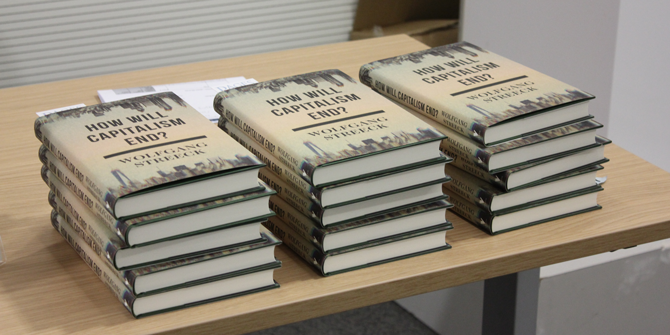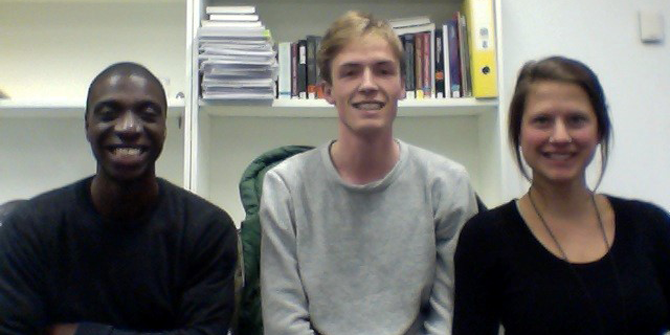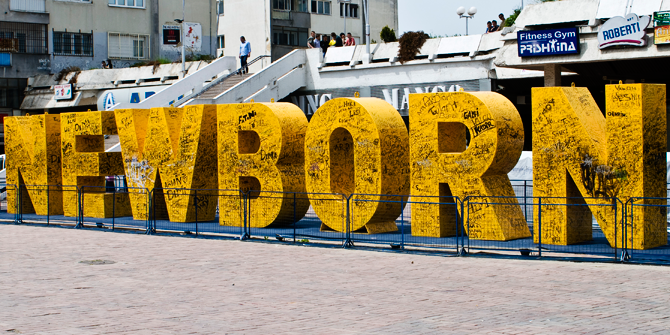Department of Government PhD candidates Anahi Wiedenbrug, Antoine Louette and Temi Ogunye reflect on Wolfgang Streeck’s recent public lecture at LSE titled ‘How Will Capitalism End ?’, which took place on Monday 7 November. Listen to the event podcast.
The End of Capitalism
When one hears talks of the end of capitalism, one cannot help but assume that a superior replacement has arrived. It seems a certain kind of Marxism, with its commitments to functionalism and Hegelian historical progress, has left its mark.
But Streeck’s end of capitalism is of a different kind. As he points out, four hundred years elapsed between the end of slavery and the beginning of feudalism, so the replacement of a given social order need not have arrived when the end comes. And the period of interregnum between two systems, as Antonio Gramsci showed, is one in which the most unpredictable events can occur. So the end of capitalism, Streeck argues, will materialize as a slow fading away of our social order into a successor regime whose superiority, or indeed its nature, we cannot predict.
The question remains, however, how exactly this fading away will occur. Streeck’s answer is as snappy as it is powerful: Capitalism will end ‘from an overdose of itself’.
How Capitalism is destroying itself
Here is the reasoning, in a nutshell. Capitalism is characterised by one drive, namely capital accumulation. But this drive, if unchecked, is self-destructive. So far, a political opposition has always checked the drive. But capitalism is destroying this opposition — which is to say, its very own conditions of possibility.
Streeck elaborates as follows.
Capitalism is a progressive society, in Adam Smith’s sense: one that operates on the principle of continuous growth in productivity and prosperity. This continuous growth is brought about through competitive profit maximisation in pursuit of private capital accumulation. That’s capitalism’s main drive, its inherent logic that any account must account for.
Competitive profit maximisation leads to unbounded market expansion. Yet, Streeck argues, drawing on Karl Polanyi, there are social limits to market expansion. In particular, there are three resources to which the laws of supply and demand can be applied only partially, if at all. These are labour, nature, and money. If their allocation is left entirely to market processes, that is, if they are entirely commodified, they will be destroyed or become unusable. Take labour for example. It must meet at least two conditions in order to play its role in the capitalist economy. First, workers must maintain relations of solidarity within families and communities, otherwise they are not productive enough. Second, they must have enough to consume, otherwise aggregate demand is too low. For the first condition to be met, workers need a decent amount of time off work, and for the second condition to be met, they need relatively high shares of produced wealth. If they don’t, capitalism begins to self-destroy.
Political struggle — characterised by Polanyi’s double movement between commodification, when capitalists triumph, and socialisation, when the opposition does — explains the viability of capitalism. So far, political opposition has managed to prevent labour, nature, and money from being entirely commodified. Take the first of these again. In the past, workers have been protected from an unfettered capitalism by socialist recriminations and trade union activism. And under Keynesianism and Fordism, opposition has secured a relatively high level of wage and welfare redistribution.
Yet capitalism is defeating its opposition. Many enjoy the unprecedented growth in wealth, despite its slowing down and incredibly unequal repartition. The masses, both poor and less poor, seem firmly in favour of consumerism, and firmly against collective action. Black Fridays flourish as trade unions slowly die away.
The defeating of the opposition is the victory of the commodification movement — and the increasing unviability of capitalism. Return to labour. In the absence of an opposition, its commodification may have reached its critical limit. On the one hand, the deregulation of labour markets is increasing the number of working hours, work is invading family life, and interactions turn into various pressures to upgrade one’s human capital. Familial and communitarian solidarities are being threatened, and so is the productivity of the work force. On the other, unemployment is endemic, employment is more precarious, and a top one per cent of the population that prefers to invest in the financial economy is appropriating increasing amounts of wealth. Capitalist supply may not be meeting adequate aggregate demand for long, which would hinder the accumulation process at the heart of the system.
In both ways, capitalism is destroying itself.
Streeck’s opinion on economic fetishism
Finally, let me focus on one question asked during the Q&A. An audience member asked for Streeck’s opinion on Marx’s analysis of economic fetishism, that is, the tendency to make sense of socially constructed market phenomena as natural and unchanging, which Streeck seemed to have dismissed, as explaining the defeating of the opposition. Streeck rejected this analysis as too deterministic, because functionalist, and insisted instead on redistribution of produced wealth as the key explanation here.
But this answer seems problematic. If Streeck insists that decent redistribution of produced growth is opposition-defeating, then his account seems to run into internal trouble. This is because he also points to indecent redistribution of produced growth as he analyses labour commodification. So on his view, it should follow that opposition is defeated less effectively, and that political instability and social contestation is simmering. But at the same time, he insists that capitalism is currently destroying itself because it is defeating its political opposition. So we seem to end up with two conflicting claims. Capitalism is coming to an end because it has no political opposition calling, among other things, for decent redistribution of produced growth, on the one hand, and the current lack of decent redistribution should create political opposition, on the other.
Now, a solution may be to bring economic fetishism back in as the main compliance-securing mechanism, instead of decent redistribution of produced growth. And it seems that Streecks’ analysis of capitalism’s destruction of the opposition can easily accommodate, and in fact welcome, economic fetishism. His claim that the masses seem firmly in favour of consumerism is liable to an analysis in terms of their tendencies to naturalise commodities, markets, and their roles as buyers and sellers.
But wouldn’t the bringing back in of economic fetishism make Streecks’ account deterministic, because functionalist, as he complained in his answer to the audience member ? Perhaps not. A functional analysis explains the character of a thing in virtue of it’s being functional for something else. And if an analysis of our fetishist tendencies to naturalise market processes explains them as being functional to the smooth workings of capitalism, then this analysis is functionalist. But it doesn’t seem to follow from the fact that an analysis is functionalist that it is deterministic. Birds’ hollow bones are functional for flying. But from this it doesn’t follow that the evolution processes through which birds developed hollow bones are deterministic. Likewise, it seems that a functional explanation of economic fetishism need not be deterministic.
Be that as it may, Streeck’s new contribution to the study of capitalism is outstanding. Anyone willing to understand capitalism’s inner workings, and inner undoings, should read it. It is, after all, nothing else than one of the best analysis of the world we live in. And of the way it is going to end.
Anahi Wiedenbrug, Antoine Louette and Temi Ogunye are PhD candidates in the Department of Government.
Note: this article gives the views of the author, and not the position of the LSE Department of Government, nor of the London School of Economics.







